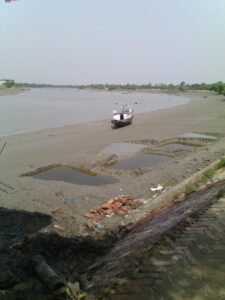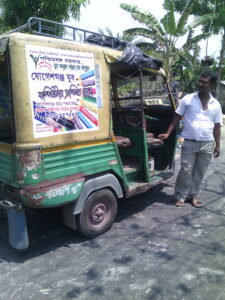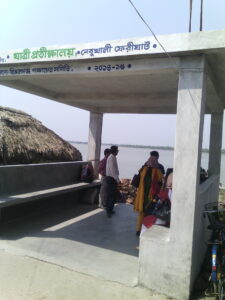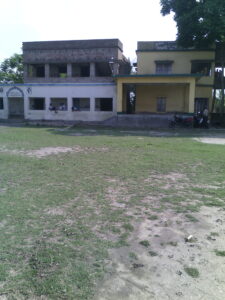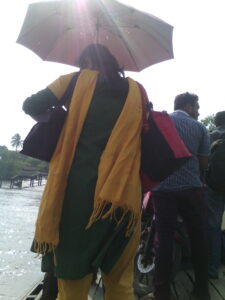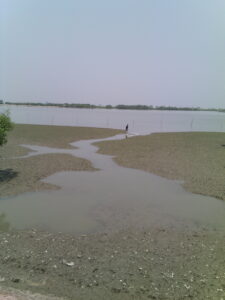Education in Bengal: A teacher’s trauma
Destination: Kalitala High School, Hingalganj block, on the India-Bangladesh border, 120 km from Kolkata
Protagonist: A young teacher
This is the story of a teacher, of her intense passion for teaching, of her undying spirit and above all her daily struggle for survival. She’s been taking the long and arduous journey from Dum Dum to a remote hamlet called Kalitala in Hingalganj in north 24 Parganas on the India-Bangladesh border over the past five years.
With a backpack slung over my shoulder, I set off for Kalitala in the wee hours of Friday, 11th April. The Hasnabad local chugged out of Sealdah station at 6.12am. A relatively empty compartment greeted me.
My protagonist boarded the train from Dum Dum station, about 15 minutes’ train journey from Sealdah. The 32-year-old teacher was my co-passenger.
My mission was to experience first-hand the harsh reality of her professional life, touch base with the teachers who’ve been taking this ruthless route, witness their gruelling and inhuman daily journey, feel their pain and agony and finally to unravel the Truth which we hardly dare to confront.
As the train reached Basirhat station, my co-passenger told me to eat breakfast.
“Inside the compartment?”, I asked with a sense of disbelief.
“You won’t get time to eat your breakfast once you get off the train at Hasnabad. It’s a long journey and we’ll have to cross two rivers and rush to reach our destination,” she said, her nonchalance simply amazing.
As the train screeched to a halt at Hasnabad station after 2 hrs and 15 minutes, we rushed out of the compartment and started walking down the platform at a brisk pace. Then we sprinted down the dusty road to reach the ferry ghat, about one km away to catch a boat.
As my eyes travelled over the Ichhamati river, Tagore’s poem Ichchamati crossed my mind.
Jokhon jemon mone kori
Tai hote pai jodi
Ami tobe ekkhani hoi
Ichchamati nodi…
(1922)
We, including six teachers, boarded the boat and crossed the Ichhamati in about four minutes. The puttering of the motor boat was grating on my nerves. Our co-passengers on the boat ride included a couple of goats. We reached the other side of the river which is called Par-Hasnabad!
You know how much I paid for the boat ride? Just Rs 1!
I was told one could have a boat ride even at 50 paise two years ago.
Wow!
We then scrambled over the bumpy road to get into a big-sized auto. The second-leg of the journey began.
As our auto struggled along the bumpy country road, I looked around and found life in this part of the world so unhurried, leisurely, care free!
Turkish author Ahmet Rasim’s words: “The beauty of a landscape resides in its melancholy” came to my mind.
With our auto honking its way through the road, I saw a few kids waving at us, their wonderment evident. The auto came to a screeching halt at Nebukhali ferryghat after about 50 minutes.
We crossed the river (two rivers Goureshwar and Sahebkhali mingle here before joining Raimangal) by a motorized boat and reached Dulduli. The April sun was beating down on us as the final leg of the journey began. We boarded another auto which took 45 minutes to reach Kalitala High School.
It was 10.40 in the morning. I traveled almost four and half hours while for my protagonist it is four hours and 15 minutes’ of daily drudgery to reach her workplace.
Despite this punishing schedule, my protagonist doesn’t gripe. She accepts all this with equanimity. Even though the unrelenting journey has sapped all her energy, she remains committed to her task: the task of educating village kids. She picked up the attendance register and went straight to a classroom without losing a single moment.
I saw the schoolkids going into rhapsodies the moment they saw their beloved teacher walking into the classroom.
“All my travel traumas disappear when I see kids gleefully listening to me and appreciating my class; I get huge satisfaction when I see this,” she said, her content and delight palpable.
She has been doing this for the past five years since she got her job after passing the SSC Exam.
Imagine a teacher in Bengal spending almost eight and half hours every day just on the way to eke out a living. Come rain or shine, she has to traverse this terrain all through the year.
Can she do the task she was appointed for?
How can she teach after such a grueling and back-breaking journey? She’s jaded; she is exhausted. She is almost drained out.
The heartless government feels she should be grateful to even be employed.
Educating a child is an exalted and noble task and a teacher is entrusted with this job. By no stretch of imagination can one justify this inhuman and pitiless posting. These teachers will suffer burnout at an early age, for sure.
Who bothers if a teacher is posted at a faraway place or not? Who cares if a child doesn’t get the best from his/her teacher?
Senior officials in the education department hardly ever bother about the psychological state of these teachers? They are so heartless, so merciless.
Education has taken a backseat in Bengal. Bengal is busy in politicking only.
My protagonist’s return journey began at 3.45pm. She will have to go through the same agonizing journey. She can’t escape this harsh reality; she is left with no alternative.
She’ll have to take the same ruthless route again tomorrow morning. No one knows when her ordeal will come to an end.
She seems to have accepted Thomas Hardy’s words: “Happiness is but the occasional episode in the general drama of pain.”
In a world of an unrelenting 24-hour social-media-driven news cycle, our media hardly cares for my protagonist and her perpetual harrowing experience.
Is the education minister listening?
